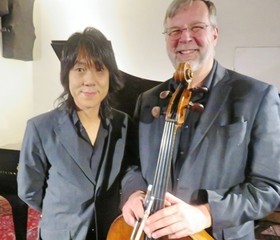|
Back
Duo Devotion New York
Spectrum, 121 Ludlow Street
01/19/2016 -
Johann Sebastian Bach: G Major Sonata for Viola da Gamba and Harpsichord in G, BWV 1027
Claude Debussy: Sonata No. 1 for Cello and Piano
Alfred Schnittke: Sonata for Cello and piano No. 2
Serge Prokofiev: Sonata for Cello and Piano, Opus 119
Eric Edberg (Cello), Taka Kigawa (Piano) 
T. Kigawa, E. Edberg (© Samuel A. Dog)
Eric Edberg and Taka Kigawa had no intention of making their recital easy on their audience last night. Instead of Schnittke’s popular and idiosyncratic First Cello Sonata, they played the spiky mournful Second Sonata, written when the composer was on death’s door. Instead of a Bach cello sonata, they imitated other instruments in a work supposedly for gamba and harpsichord. And while their choice of Debussy’s late Cello Sonata is relatively popular, the late Prokofiev Sonata, written almost in tandem with the Cello Concerto and Sinfonia Concertante is–for reasons unknown–simply never performed.
Yet if the audience packing Spectrum’s salon/library/museum/ Lower East Side wooden concert hall was apprehensive, they hardly showed it. Obviously New York’s cellists abounded. But that rarefied clique which idolizes Taka Kigawa wouldn’t have missed the recital. And while I was not familiar with Eric Edberg before, his musical alliance with Mr. Kigawa was a lure, if not guarantee of artistry.
It was no surprise that Mr. Kigawa played without fault and–in the later works–with an emotion parallel to his stunning technique. After all, his recitals are always more than unusual. They produce an artist who almost instinctively aims for the marrow of the music and almost inevitably reaches his goal.
True enough, in the opening Bach piece, Mr. Kigawa never attempted the lightness of the original harpsichord. In Bach’s light danceable Sonata, his two-handed counterpoint–basso continuo on the left hand, dancing flurries in the right– if not stiff, hardly reached the rare Bach humor, the impression that old Johann tossed it off for a friend, maybe finishing it in the time it takes to play.
Mr. Edberg, though, made up for that with a swinging and light-toned cello. The old-looking wooden instrument can make the lightest sounds, his first notes in the Allegros jumped away from the strings into the audience.
The following Debussy gave more room for color, and the opening Prologue showed both players aiming for an ancient aura, a nobility. Mr. Ekberg held back his large voice for an intimate subject, Mr. Kigawa gently prodding him on. During the agitato, the cellist never let that intimacy go, ending with those ghostly hollow chords.
In the middle, the cellist plucked and bowed his way to the imitation of guitar, flutey melody, even a tambourine or castanets at times. While the finale was also rather mordant, Mr. Kigawa finished with those apparitional triplets.
Their final two works were separately challenging (obviously for the players, but also listeners) and noble (ditto). Perhaps Schnittke, in those last days after his third stroke was quoting from other composers, as was his wont. But if so, these quotes were hidden in a massive jungle of notes by piano and cello. The motif was a chromatic scale, as Mr. Edberg pointed out. Yet even this was hidden as the music was plunging–not walking but plunging–into an impenetrable landscape of Schnittke’s own devising.
The result here brought out Mr. Kigawa’s splendid emotional feeling, his own dense piano chords against the even harder playing on the strings by his partner.
The last work, written by another ailing composer, was anything but moribund or mystical. The endless melodies seemed spun out of the younger Prokofiev, the variations were played with inspiration. The same kind of inspiration which Mstislav Rostropovich instilled in so many other composers.
I made it a point not to hear Slava’s own recording of the work. Mr. Edberg himself opened with a single chorale, continued with a childlike scherzo and finished with cello playing not only virtuosic but forming a column which rose even higher until the end.
As for Mr. Kigawa, his own intensity makes me concerned about tonight’s recital by Marc-André Hamelin. More and more, Mr. Hamelin is taking his performances for granted, swinging through his music with more dexterity than devotion. It has given him a lot of admirers, granted. But Taka Kigawa never swings through his music. His Prokofiev was played with depth, attention, intensity and breadth.
Harry Rolnick
|